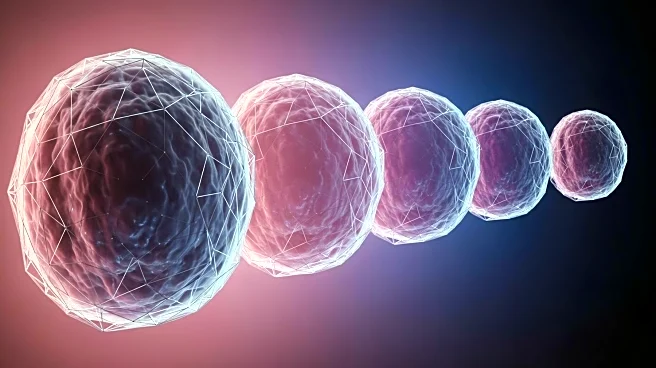What is the story about?
What's Happening?
A recent study has investigated the effects of long-term low dose-rate radiation on cellular dynamics in tumor evolution. Using BEAS-2B cells, researchers established a cell model to study tumorigenesis and malignant phenotypes. The study found that prolonged exposure to low dose-rate radiation is linked to increased malignancy, characterized by more copy number variations and epithelial-mesenchymal transition events. The research identified a specific ligand-receptor pair, ANGPTL4-SDC4, which enhances cell malignancy by promoting angiogenesis in lung tumor cells. This study provides new insights into the mechanisms driving tumor evolution in lung cancer.
Why It's Important?
Understanding the impact of long-term low dose-rate radiation is crucial for professionals engaged in radioactive work and for public health. The study offers valuable insights into the dynamic processes of early tumor evolution, highlighting the increased genomic instability and malignancy associated with prolonged radiation exposure. These findings could inform safety protocols and radiation exposure guidelines, potentially reducing cancer risks for individuals in radiation-prone environments. The research also contributes to the broader understanding of tumor biology and the factors influencing cancer progression.
What's Next?
Further research may focus on exploring the molecular mechanisms driving tumor evolution under low dose-rate radiation, potentially leading to new therapeutic targets for lung cancer. Studies could also investigate the broader implications of radiation exposure on other types of cancer and the development of protective measures for individuals in radiation-exposed professions. The findings may prompt discussions on revising radiation safety standards and enhancing monitoring of long-term exposure effects.
Beyond the Headlines
The study underscores the importance of integrating genetic and non-genetic determinants in cancer evolution research. It highlights the need for comprehensive studies on the biological impacts of radiation exposure, which could lead to advancements in cancer prevention and treatment strategies. The research also emphasizes the role of cellular communication and angiogenesis in tumor progression, offering new perspectives on cancer biology.















